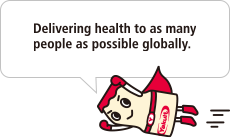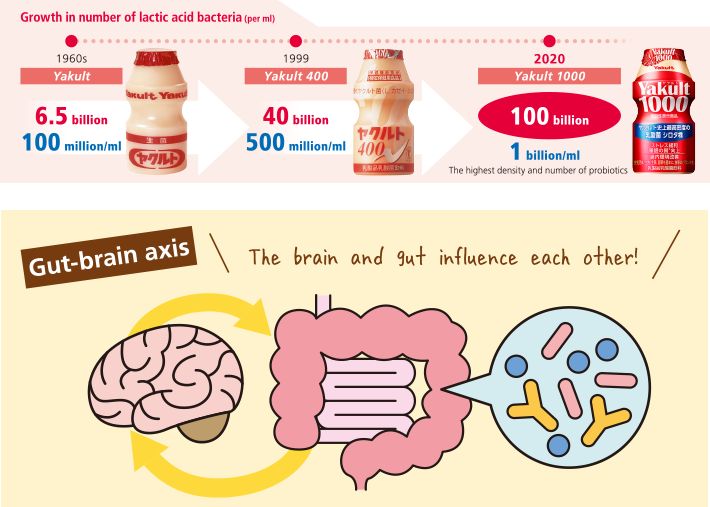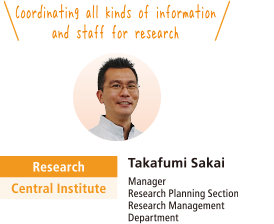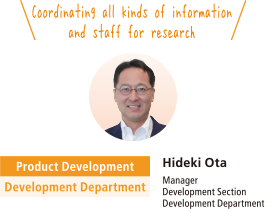

Creating new value by continuous research and development on a daily basis is important in order to evolve into a healthcare company with the goals of delivering good health to as many people as possible around the world, offering customers new value that matches their needs, and realizing a society in which people and the planet co-exist.
In this section, we will present our innovations.
In an era when treating illness after getting sick using therapeutic medicine was the norm, Yakult's founder, Dr. Minoru Shirota, aimed for a new perspective on achieving health by helping people prevent illness through preventive medicine, and began his research by focusing on the power of microorganisms. This led to the discovery of a strain of lactic acid bacteria that can reach the intestinal tract alive and suppress harmful bacteria in the intestines by strengthening and culturing it. This strain was Lactobacillus casei strain Shirota, the starting point of our innovations at Yakult.
Dr. Shirota advocated the concepts of “a healthy intestinal tract leads to a long life” and “a price anyone can afford,” from the belief that making the intestines that take in nutrients strong leads to healthy and long lives, and the desire to make drinks with Lactobacillus casei strain Shirota, which protects the intestines, available to as many people as possible. This lead to the development of the Yakult fermented milk drink. Today, Dr. Shirota’s spirit lives on at Yakult as we continue to connect new research findings on lactic acid bacteria to product development, and create new products that contribute to the health of people around the world.

In recent years, global research has been advancing on the gut brain-microbiota axis. It is an addition of the microbiota to the gut-brain axis, in which the functions of the brain and gut influence each other.
Yakult has also been doing research in these fields, and has confirmed that regular drinking of a fermented milk drink with a high density and high bacterial count of Lactobacillus casei strain Shirota alleviates the stress and improves sleep quality of healthy medical students under temporary mental stress.
To achieve the high density and number of probiotics and high bacterial count for a commercial product, we developed a new culturing method and determined the ideal formulation and conditions for growing Lactobacillus casei strain Shirota and maintaining the number of bacteria during product storage. As a result, we were successfully able to achieve the highest density and number of probiotics of any products in Yakult history. Yakult 1000 has Yakult’s unique flavor while maintaining the functionality of the high density. Filled with the passion of the R&D staff, Yakult 1000 was released nationwide in Japan in April 2021. Mental healthcare is considered important in our stressful modern society. Going forward, Yakult will continue providing new value to help solve social issues by leveraging the R&D technologies that we have developed over many years.







*Affiliations and positions are as of October 2021.

Sakai: With the desire to contribute to the health of people all over the world, Yakult has always aimed at solving social issues related to health.
Ota: Our founder, Dr. Minoru Shirota, practiced preventive medicine to save children from dying of infectious diseases. I think this is the innovation that was the key to addressing social issues. We have inherited that venture spirit and committed to conducting research, product planning and development on a daily basis in order to meet the diversifying needs of a wide range of users.
Sakai: The Yakult Central Institute conducts basic and applied research focusing on microorganisms such as lactic acid bacteria. Our main role is to create the seeds for Yakult products and services.
Ota: The Development Department is responsible for developing products based on research findings by the Institute. We also conduct technological development for containers and packaging as well as new materials.
Nishikawa: The Corporate Planning Department carries out trials of new services and businesses in order to create innovation at Yakult. The Medical Biome Group within the Department plans new products and builds sales channels to address social issues in the medical field. We also collaborate with related departments as necessary in order to create new value for Yakult.
Ota: We believe that cross-departmental collaboration will become even more important to understand the perspective of our customers and create new value that is beneficial to society.

Ota: To enhance Yakult’s corporate sustainability in the future, we believe that the key will be business activities that help realize “a society in which people and the planet co-exist” while utilizing limited resources effectively and minimizing impact on the global environment and animals. Our products’ ingredients are mainly derived from natural resources such as milk and plants. In our search for new materials that take into account both environmental conservation and biodiversity, we have focused on plant-based ingredients and materials.
Sakai: For plant-based ingredients, Yakult has a long history of research and launching products such as Bansoreicha, which uses polyphenol from guava leaves, as well as Yakult no Hakko Tonyu, which makes it easier to absorb soy isoflavones by fermenting soymilk with lactic acid bacteria. We hope to continue developing these further to create new value which includes addressing environmental issues.
Ota: We are confident that creating new value by merging plant-based ingredients and lactic acid bacteria will be vital to Yakult’s future business and will also lead to the creation of a new customer base. Furthermore, we believe that we can also contribute to solving the social issue of providing good health, which is a common desire for people worldwide.

Nishikawa: I’ve heard from healthcare providers that I come into contact with every day about problems such as growing medical expenses caused by the aging population and antibiotic-resistant bacteria due to overuse of antibiotic. I felt that there may be something that we at Yakult can do to help address such issues through nutritional supplements that make full use of Yakult’s resources.
Sakai: At the Central Institute, we have been conducting research on the relationship between symbiotic bacteria and diseases for a long time. We are looking forward to using our research findings to address these issues in the healthcare field and to further developing this into a new business opportunity.
Nishikawa: One of our advantages is that we do not have to be concerned about side effects, because we currently offer food products. Healthcare providers can safely recommend them to patients, and I believe that they will be useful in supporting patient treatment. Along with the Yakult products presently in the market, we hope to increase our product lineup and continue to meet customer expectations in this new field of medical care and nutrition.